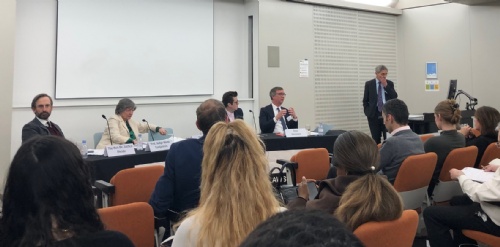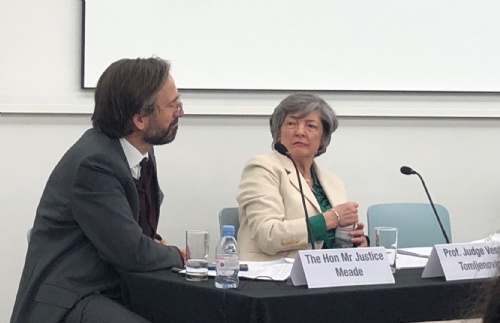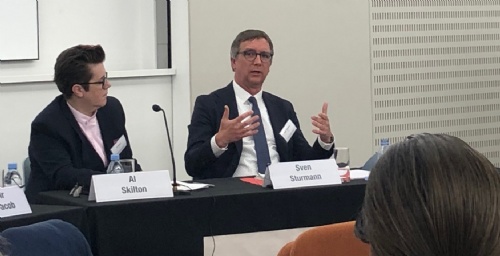Now in its twelfth year, Class 46 is dedicated to European trade mark law and practice. This weblog is written by a team of enthusiasts who want to spread the word and share their thoughts with others.
Click here subscribe for free.
Who we all are...
Question the Trade Mark Judges 2023
On 7 March 2023, UCL-IBIL and MARQUES hosted the latest “Question the Trade Mark Judges” event. The Q&A panel discussion covered various timely issues in EU and UK trade mark law and procedure. Around 70 trade mark practitioners and UCL students (with a further 25 online) were given practical insights into the workings of the various tribunals represented by the panellists:
- Al Skilton, Senior Hearing Officer of the UK Intellectual Property Office;
- The Hon Mr Justice Meade, England and Wales High Court;
- Sven Sturmann, Chair of the Second Board of Appeal of the EU Intellectual Property Office; and
- Professor Dr Vesna Tomljenovic, Judge of the General Court of the EU.
 The evening was hosted by Roland Mallinson, Partner of Taylor Wessing LLP and member of the MARQUES Executive Team, and Professor Sir Robin Jacob, the Chair of IP Law at UCL.
The evening was hosted by Roland Mallinson, Partner of Taylor Wessing LLP and member of the MARQUES Executive Team, and Professor Sir Robin Jacob, the Chair of IP Law at UCL.
Thanks to Elena Glengarry and Fabio Lo Iacono of Taylor Wessing for providing the following summary of the discussion.
Specifications
The panel discussed the length and breadth of specifications of trade mark applications, in relation to a question directed at possible reforms to UK trade mark law with the potential 'sunsetting' of various provisions as a result of the Retained EU Law Bill.
While acknowledging that no significant overhauls should be made at the moment in the interests of keeping procedure intact, the judges noted that very long specifications make comparisons of goods and services more time consuming and complex for judges, so perhaps there could be new rules surrounding this.
They suggested that the EU could consider narrowing the non-use period, perhaps to three years, and consider bringing in ex-officio examination similar to the USA to try and combat overly broad protection.
Written submissions
The panel was asked whether written submissions are too long in trade mark cases they hear. They agreed that written submissions carry the most value when they are clearly structured and directed at the key issues, and are not repetitive. This was also supported in relation to skeleton arguments – they want representatives to wrap up the case briefly and concisely.
 The importance of representatives using native speakers of languages to prepare written submissions was also highlighted – it is obvious to the EUIPO when representatives use automatic online translation services (such as Google Translate).
The importance of representatives using native speakers of languages to prepare written submissions was also highlighted – it is obvious to the EUIPO when representatives use automatic online translation services (such as Google Translate).
Rather than lengthy repetitions of earlier points, the panel welcomed the in-depth submissions that focus on the complex aspects of a case. To illustrate, one area that tends to consistently lack this is submissions on the comparisons of goods and services between a contested mark and the earlier right.
The judges emphasised the importance of backing up submissions with evidence to support a finding of similarity, for example where there has been evidence of a shift in attitude among consumers.
Online hearings
The judges were also asked if there is any need to go back to in-person hearings, considering that virtual hearings can save time and money. Online hearings can be more exhausting because the discussion can be difficult to moderate, and they require intense focus as the parties appear across multiple screens. Non-verbal communication and the subtleties in court are also missed; however the judges noted that online hearings did not seem to cause problems when assessing witnesses online.
Online hearings may also obstruct settlement between the parties because it is not possible to conduct negotiations "in the corridor". So overall, online can be satisfactory but not for important cases.
At the EU level, online hearings can be very practical as attending hearings in person in Luxemburg is expensive. However, it seems that most of the time oral hearings should not be requested in the first place, as usually the parties repeat what has been argued in the written submissions.
There is also the issue of adhering to the open justice principle and avoiding misuse of the video – a live feed of the online hearing may be appropriate in some cases, but English courts do not generally allow the public to record the hearings. A possible solution is asking the interested public to register to attend the hearing, so they can join with specific links, and access can be monitored.
The judges also noted that clear written submissions are also helpful if there is an audience at a hearing.
Reputed marks, judicial notice, proof of use
 Building on the discussion of written submissions and defences to actions, the panel provided their views on proof of use and reputed trade marks. Particularly where a reputed mark is concerned, the panel agreed that evidence of proof of use is not always gathered well.
Building on the discussion of written submissions and defences to actions, the panel provided their views on proof of use and reputed trade marks. Particularly where a reputed mark is concerned, the panel agreed that evidence of proof of use is not always gathered well.
Owners should gather and submit as much evidence as possible, to avoid falling short and potentially failing to prove use, even where the mark is very famous in reality – such as the BIG MAC trade mark registration which was initially revoked for this reason (a decision that was reversed on appeal after further evidence was submitted).
Sir Robin asked whether judges should be permitted to take judicial notice of the fame of a trade mark, or whether you should always need to submit evidence. The UKIPO has taken notice of a mark’s fame before, but only in the clearest of circumstances.
The judges discussed having a register of marks with accepted well-known/reputed status, as happens in countries such as China, which could cut down on evidence costs, However, it would be difficult to determine where to draw the line in respect of the goods and services that mark is accepted to be famous for.
Such a system would not be procedurally useful if the status was contested by another party, and the judge would have to do the full analysis of evidence of reputation anyway. It is a difficult line to draw, but where possible parties should continue to refer to earlier decisions where they have successfully proved reputation.
Geographical names and weak marks
The panel discussed the recent Iceland case, where the EUIPO dismissed Iceland Foods' appeal against the cancellation of its EU trade mark registrations for ICELAND. The panel considered that such geographic marks can be allowed in certain circumstances, however they should generally be treated with caution. It was queried whether EU bodies should be much stricter in allowing their registration.
Building on this discussion, Sir Robin posed the question of whether we are too soft on allowing the registration of weakly distinctive trade marks in the EU and UK. The panel generally agreed with this, and also noted that now the General Court is trying to shape EU case law on this and prevent disparities in decisions by having specialised judges harmonise their approach.
The judges highlighted the complicating factor of there being 24 official languages in the EU, as well as other languages that are widely understood. Sometimes this makes it very difficult to avoid finding a likelihood of confusion.
Artificial intelligence
| Amicus Curiae |
|
The panel addressed the importance of the submissions made by associations such as MARQUES. The EUIPO welcomes views from associations representing interests of third parties and clarified that, at Office level, the submissions can include multiple arguments. MARQUES often considers submitting third-party comments in relevant cases. If you know of a case that MARQUES might wish to intervene in, please contact a member of the Amicus Curiae Team to discuss. |
The panel was asked to consider if artificial intelligence (AI) or virtual judges in trade mark cases could be a good thing to implement. The use of AI can be useful to triage trade mark cases when offices are experiencing high volumes; however this use should be restricted to simple tasks.
AI can also be useful for comparing long lists of goods and services and possibly for deciding on identity cases or simple similarity cases. This is because the AI may be better placed to have a consistent approach in assessing the likelihood of confusion with reference to relevant case law.
The judges noted that, in some cases, it is difficult to predict what the answer of the AI would be. For example, AI does not seem able to differentiate between figurative marks. As AI works with percentages, assessments based on balance of probabilities are more difficult and the AI may not make the best assessment in line with the relevant tests.
There are also problems of access to justice and audit to consider, so it may be premature to give a definitive answer on the use of AI in relation to more advanced cases. In general, a better understanding is needed of what AI really is.
Earlier rights
Another question raised was whether it could save time and money, without denying justice, to require opponents and claimants to rely on no more than two or three prior rights. The panel recognised that, most of the time, one or two earlier rights are enough.
The UKIPO already limits the number to six in normal oppositions and three in fast-track oppositions. The EUIPO does not have a similar system and introducing new rules to limit the number of earlier rights would need to be done carefully.
There might be some benefits in including all the earlier rights, even if it does make the assessment more detailed for the Office. This is because the opponent has more options if alternative grounds fail.
MARQUES hosts Meet the Judges events in various countries and is currently planning further meetings. For more details, view the Events page. The photos in this post were taken by MARQUES
Posted by: Blog Administrator @ 17.44Tags: UCL-IBIL, Meet the Judges,


 Sharing on Social Media? Use the link below...
Sharing on Social Media? Use the link below...Perm-A-Link: https://www.marques.org/blogs/class46?XID=BHA5168

